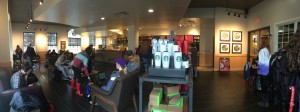Multimedia story with Paige Alvarez.
 It’s a chilly morning and you’re headed to class for your 8 a.m. lecture hall. You’re walking through the courtyard, letting out a wide yawn, when you have the sudden urge to caffeinate yourself in the best way that you know how: coffee.
It’s a chilly morning and you’re headed to class for your 8 a.m. lecture hall. You’re walking through the courtyard, letting out a wide yawn, when you have the sudden urge to caffeinate yourself in the best way that you know how: coffee.
You slow to a stop in the middle of the dry catafount and study the buildings surrounding you. Do you brave the ferocious line of Starbucks for some rich espresso roast? How about grab a bagel and skinny vanilla latte from Einstein’s? Or you could stop in for a quick drip from Java City on your way to the library.
For many consumers, the choice is a toss up between what’s popular and what’s easy, and it’s no different for Western Carolina students when deciding where to grab their daily dose of caffeine. So, what do WCU coffee consumers value more: brand or convenience?
Brand name corporations spend millions of dollars promoting their name and building an affinity for their products each year. Starbucks, the largest coffeehouse company in the world, utilizes this exposure to attract more consumers because many coffee drinkers feel familiarized with them due to the millions of locations they have around the world. This type of publicity can cause people to prefer Starbucks to lesser-known coffee brands because it’s what they see every single day. But is that what is important to coffee consumers on campus?
To gather information about student and faculty opinions on the coffee shops around Western Carolina, we created an informal Facebook survey in which participants were asked about their personal coffee habits. Of the 50 anonymous replies received, 50 percent of students and faculty at WCU said that they go to Starbucks more than any other coffee shop on campus and 62 percent of respondents said that, in their opinion, Starbucks has the best tasting coffee around.
But when doing personal interviews with students on WCU’s campus, and studying coffee habits throughout the nation, the competition between brand and convenience is hardly a contest at all.
According to a study done by the Specialty Coffee Association of America (SCAA), Hospitality Today stated that young people have far less brand identity or loyalty than their parents did, and in agreement with this statement the interviewees we spoke to, ages ranging from 19 to 24, made it a point to say that they do not go to Starbucks at all, but would rather go somewhere more convenient and that has better coffee.
In regards to what consumers find important, our survey asked students and faculty to rate the importance of factors such as cost, convenience, taste, atmosphere, and acceptance of declining balance when deciding where to buy their daily cup of coffee. We discovered that one of the biggest factors when deciding where to buy coffee, ranking only second to taste, is convenience. Hailey Medder, a sophomore, explained that she stops in Java City daily because she spends a lot of her time in the library, and many of her classes are in Stillwell, so it is always the easiest option. Many other students agreed with Medder, saying that they get coffee from whichever place is closer to their buildings.
There were even a few students and faculty members that said they make their coffee at home or in the office using K-cups and other types of coffee pods.
“Using my Keurig is way more convenient than walking across campus to Starbucks or up the hill to Hillside,” commented an anonymous survey participant, going on to say that coffee is coffee, no matter what machine it comes from.
In relation, Roberto A. Ferdman, writer for the Washington Post, illuminates the value of convenience among coffee drinkers in his article “It’s true: Americans like to drink bad coffee” when he explains that Americans “value cheapness over quality – and convenience over everything.”
Ferdman supplies us with a lot of statistics about the coffee habits among consumers throughout America and the surprising decrease in the desire for brand name coffee. He discusses the findings of Howard Telford, an industry analyst at Euromonitor, and explains that one thing that is really changing coffee trends these days is convenience – especially with the rising popularity of pre-ground coffee pods, such as those made by Keurig. Apparently, the sales of coffee pods have grown by 138,324 percent, jumping more than tenfold since 2009, and continue to rise at an annual clip of more than 30 percent.
Telford’s data alone is more than enough evidence to prove that the country’s utmost desire is changing rapidly from the desire for brand to the desire for convenience, and the answers that we gathered from our interviews and our online survey only further support this claim.



